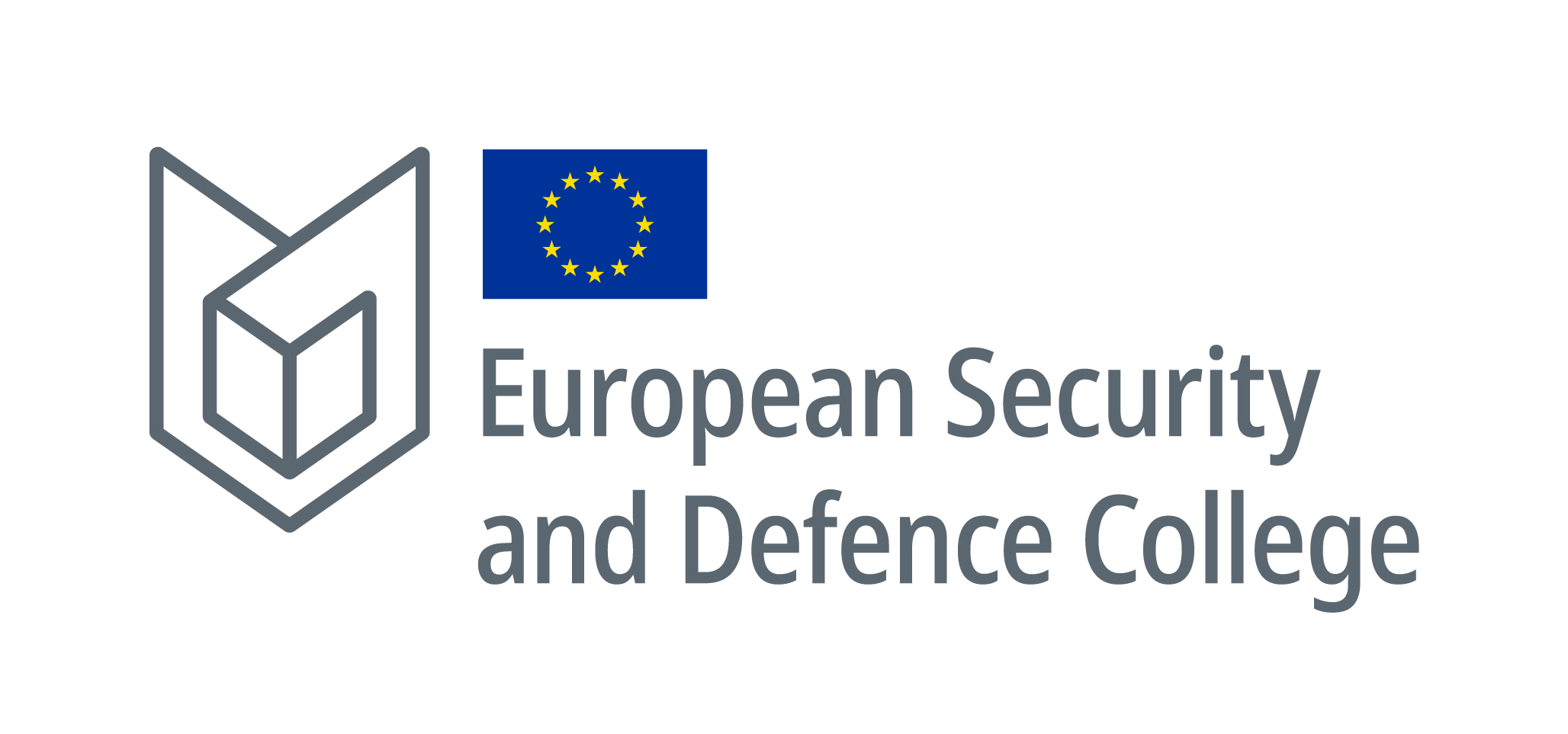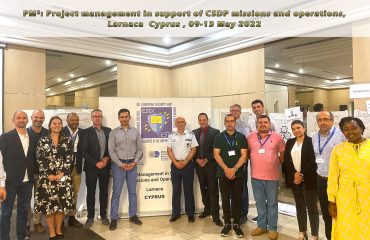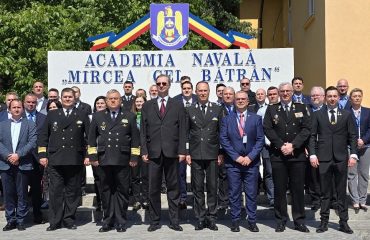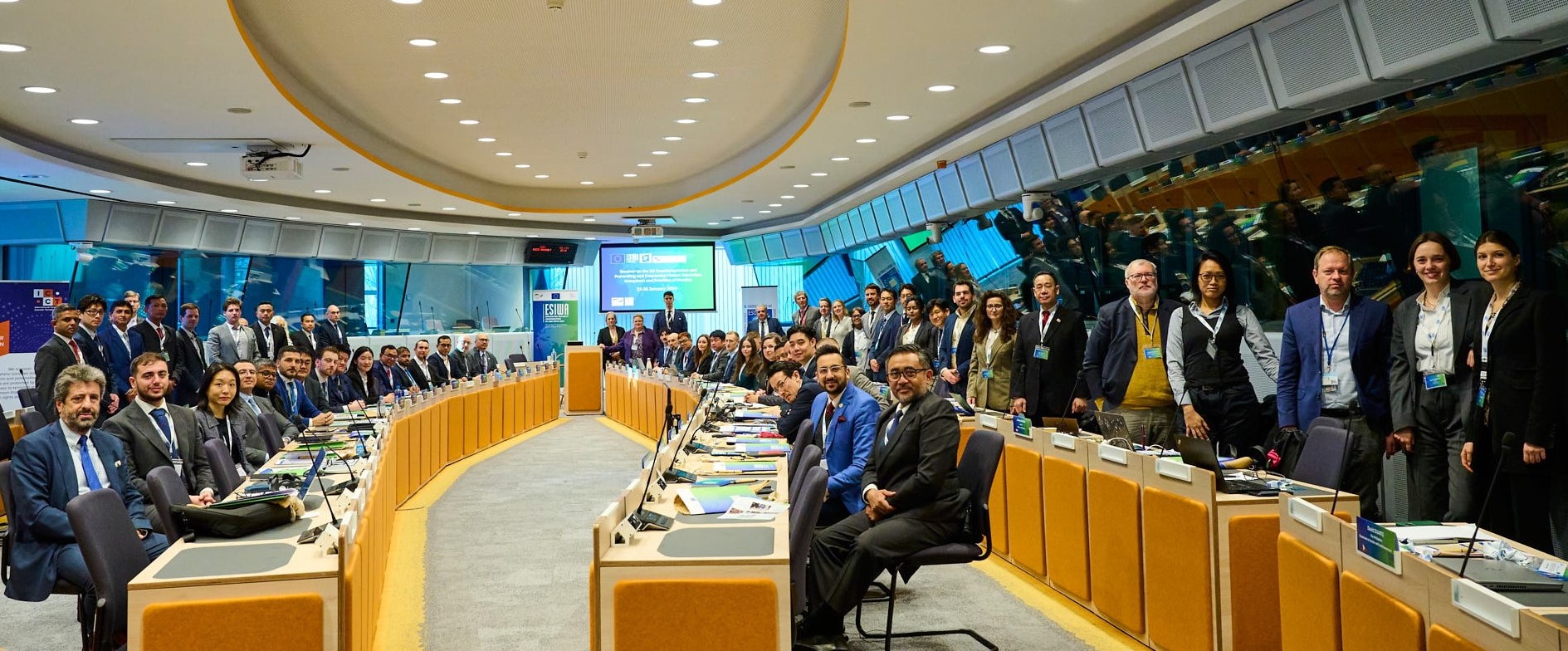 Counter-terrorism and the prevention of violent extremist ecosystems was the thematic focus of the ESDC’s latest seminar. The event, which was organised jointly with the International Centre for Counter-Terrorism (ICCT) and with the support of the EU Project Enhancing Security Cooperation in and with Asia (ESIWA), was an example of successful collaboration between the EU and countries in the Indo-Pacific region.
This seminar, held in Brussels, brought together 56 officials from EU Member States, relevant EU institutions and agencies and representatives from the following Indo-Pacific countries: Bangladesh, Indonesia, Japan, the Republic of Korea, Malaysia, the Maldives, the Philippines, Sri Lanka and Thailand. Participants were all experienced officials working in state institutions or agencies in the area of counter-terrorism. The event provided an excellent platform for exchanging experience and sharing ideas on tackling common regional and global challenges connected with terrorism, especially during the daily Q&A sessions and social events.
Counter-terrorism and the prevention of violent extremist ecosystems was the thematic focus of the ESDC’s latest seminar. The event, which was organised jointly with the International Centre for Counter-Terrorism (ICCT) and with the support of the EU Project Enhancing Security Cooperation in and with Asia (ESIWA), was an example of successful collaboration between the EU and countries in the Indo-Pacific region.
This seminar, held in Brussels, brought together 56 officials from EU Member States, relevant EU institutions and agencies and representatives from the following Indo-Pacific countries: Bangladesh, Indonesia, Japan, the Republic of Korea, Malaysia, the Maldives, the Philippines, Sri Lanka and Thailand. Participants were all experienced officials working in state institutions or agencies in the area of counter-terrorism. The event provided an excellent platform for exchanging experience and sharing ideas on tackling common regional and global challenges connected with terrorism, especially during the daily Q&A sessions and social events.
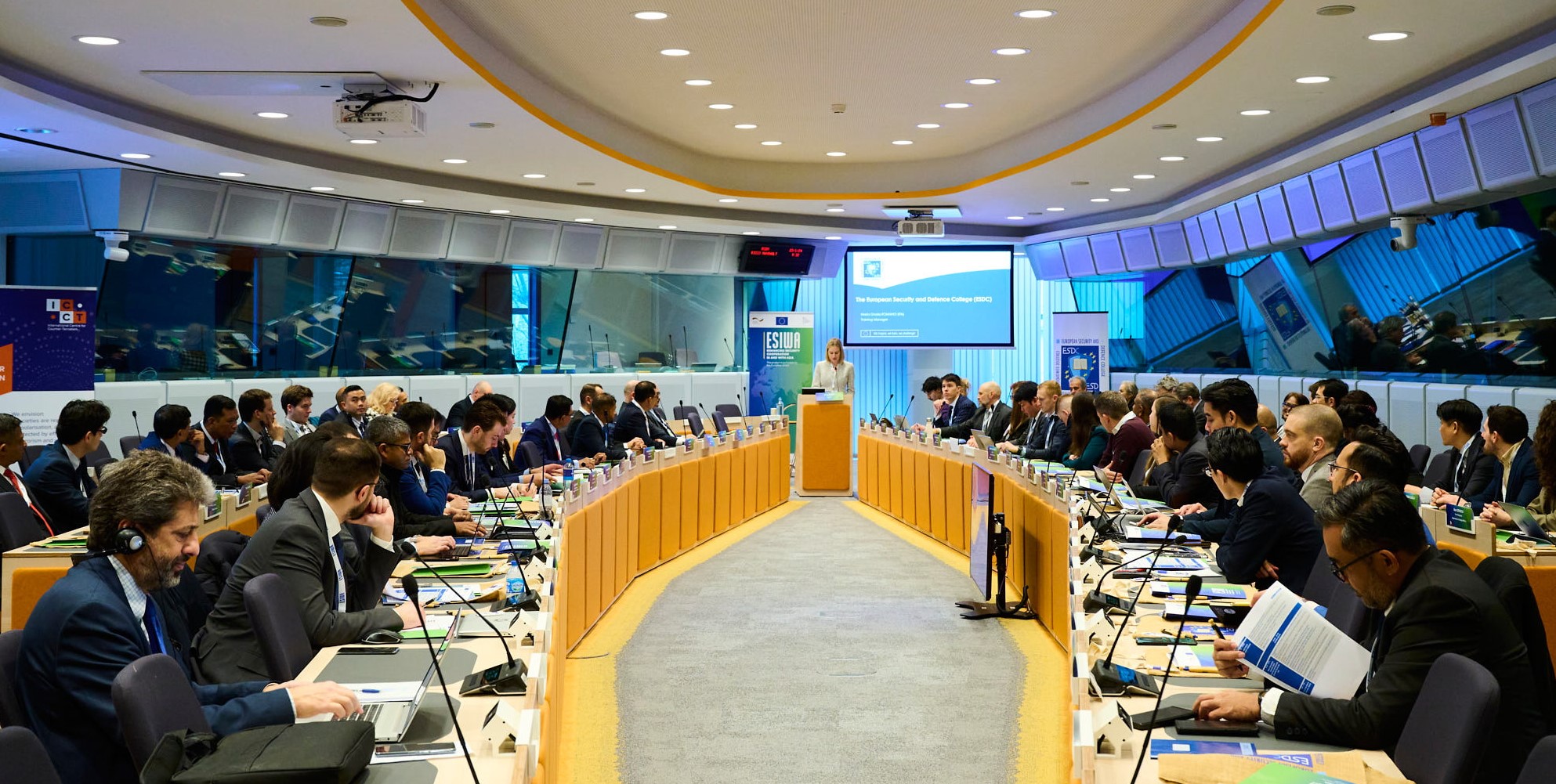 In their opening remarks, Sarah Marie Sutter, Co-Director of ESIWA, and Bibi van Ginkel, Course Director at the Clingendael International Centre for Counter-Terrorism, presented the activities of ESIWA and the ICCT respectively, while Fergal O’Reagan, Acting Head of the ESDC, warmly welcomed participants and underlined the importance of such training events, in line with the EU’s strategy for the Indo-Pacific.
The keynote speech was delivered by Stavros Petropoulos, Senior Expert for the Indo-Pacific at the European External Action Service (EEAS), responsible for the Asia-Europe Meeting and the Indo-Pacific region. Mr Petropoulos highlighted the need for the EU to engage more with Indo-Pacific partner countries, while underlining the importance of promoting dialogue and the synergies required to address the challenges posed by violent extremism in today’s complex and contested trans-regional environment.
On the first day, a range of speakers from the European Commission, the EEAS and the ICCT delivered enlightening presentations on the global terrorism threat landscape and its impact on EU security. In the afternoon, Nadia Costantini, Special Envoy for Counter-Terrorism and Head of Division at the EEAS, presented her institution’s role in furthering the EU’s counter-terrorism ambitions abroad. Other speakers discussed the EU’s counter-terrorism strategy and the importance of cooperation between key actors across the EU and its Member States, including the crucial role played by EUROPOL and Eurojust.
In their opening remarks, Sarah Marie Sutter, Co-Director of ESIWA, and Bibi van Ginkel, Course Director at the Clingendael International Centre for Counter-Terrorism, presented the activities of ESIWA and the ICCT respectively, while Fergal O’Reagan, Acting Head of the ESDC, warmly welcomed participants and underlined the importance of such training events, in line with the EU’s strategy for the Indo-Pacific.
The keynote speech was delivered by Stavros Petropoulos, Senior Expert for the Indo-Pacific at the European External Action Service (EEAS), responsible for the Asia-Europe Meeting and the Indo-Pacific region. Mr Petropoulos highlighted the need for the EU to engage more with Indo-Pacific partner countries, while underlining the importance of promoting dialogue and the synergies required to address the challenges posed by violent extremism in today’s complex and contested trans-regional environment.
On the first day, a range of speakers from the European Commission, the EEAS and the ICCT delivered enlightening presentations on the global terrorism threat landscape and its impact on EU security. In the afternoon, Nadia Costantini, Special Envoy for Counter-Terrorism and Head of Division at the EEAS, presented her institution’s role in furthering the EU’s counter-terrorism ambitions abroad. Other speakers discussed the EU’s counter-terrorism strategy and the importance of cooperation between key actors across the EU and its Member States, including the crucial role played by EUROPOL and Eurojust.
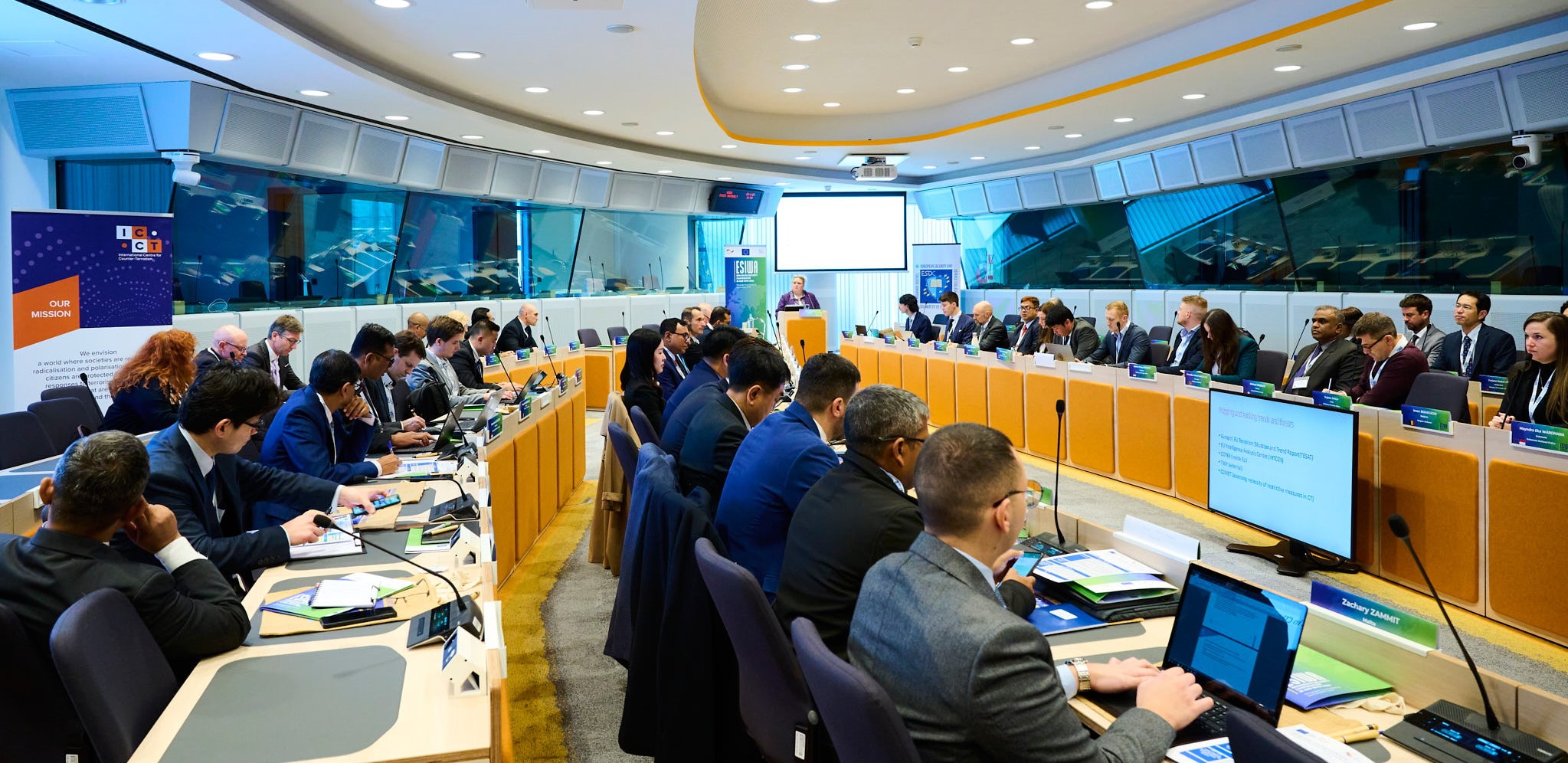 Day two focused on the EU’s strategic policies in the domain of preventing and countering violent extremism in the EU. An official from the Directorate General for Migration and Home Affairs, a representative of the Finnish Institute for Health and Welfare and a speaker from the ICCT focused on the EU’s Radicalisation Awareness Network (RAN). The topic of countering violent extremism online was also presented, which participants found of great interest, posing questions that carried on into the coffee break. The day concluded with a very successful tabletop exercise based on multi-stakeholder approaches to prevention. Participants gathered to discuss their options for responding appropriately based on the information provided and engaged enthusiastically throughout the activity.
Day three began with a focus on countering the financing of terrorism and border security. Experts from the EU Commission (DG FISMA), Frontex, universities and various think tanks contributed detailed presentations that once again prompted several pertinent questions from the audience. Marina Rafti, Deputy Head of the counter-terrorism division at the EEAS, then gave an insightful presentation on the EU’s engagement in counter-terrorism and preventing violent extremism abroad, and the ways in which the EU is becoming an increasingly important security provider in this space. The day finished with a panel discussion, in which three of the Indo-Pacific nations presented their national programmes and a discussion ensued on how to build on the cooperation between the EU and Asia in preventing violent extremism and terrorism.
The closing remarks were delivered by Richard Tibbels, Special Envoy for the Indo-Pacific at the EEAS. Mr Tibbels stressed that the EU and partner countries from the Indo-Pacific region must enhance their mutual resilience and strengthen cooperation to respond collectively to common security challenges, such as the persistent threat of terrorism. He added that capacity-building is a two-way street and that all sides had much to learn from one another through continued engagement.
Day two focused on the EU’s strategic policies in the domain of preventing and countering violent extremism in the EU. An official from the Directorate General for Migration and Home Affairs, a representative of the Finnish Institute for Health and Welfare and a speaker from the ICCT focused on the EU’s Radicalisation Awareness Network (RAN). The topic of countering violent extremism online was also presented, which participants found of great interest, posing questions that carried on into the coffee break. The day concluded with a very successful tabletop exercise based on multi-stakeholder approaches to prevention. Participants gathered to discuss their options for responding appropriately based on the information provided and engaged enthusiastically throughout the activity.
Day three began with a focus on countering the financing of terrorism and border security. Experts from the EU Commission (DG FISMA), Frontex, universities and various think tanks contributed detailed presentations that once again prompted several pertinent questions from the audience. Marina Rafti, Deputy Head of the counter-terrorism division at the EEAS, then gave an insightful presentation on the EU’s engagement in counter-terrorism and preventing violent extremism abroad, and the ways in which the EU is becoming an increasingly important security provider in this space. The day finished with a panel discussion, in which three of the Indo-Pacific nations presented their national programmes and a discussion ensued on how to build on the cooperation between the EU and Asia in preventing violent extremism and terrorism.
The closing remarks were delivered by Richard Tibbels, Special Envoy for the Indo-Pacific at the EEAS. Mr Tibbels stressed that the EU and partner countries from the Indo-Pacific region must enhance their mutual resilience and strengthen cooperation to respond collectively to common security challenges, such as the persistent threat of terrorism. He added that capacity-building is a two-way street and that all sides had much to learn from one another through continued engagement.
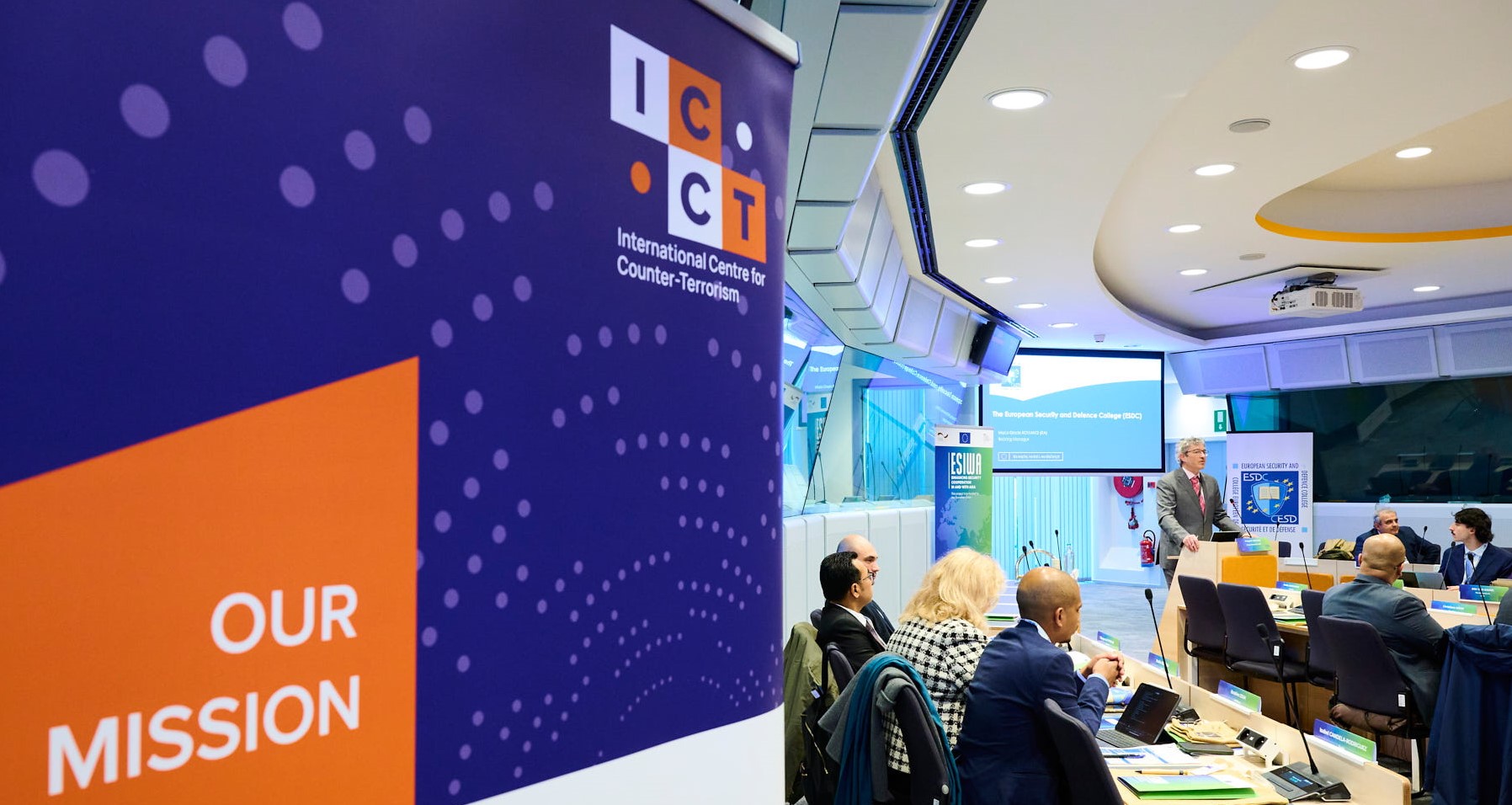 The ESDC would like to thank all the speakers for their exceptional dedication and contribution to the seminar, and to the seminar’s participants, who remained actively involved throughout the three-day event. Special thanks go to the EU delegations in the selected Indo-Pacific countries, to the course director at the International Centre for Counter-Terrorism and to the ESIWA Project and their staff for their support and collaboration during the organisation and running of the seminar.
The ESDC would like to thank all the speakers for their exceptional dedication and contribution to the seminar, and to the seminar’s participants, who remained actively involved throughout the three-day event. Special thanks go to the EU delegations in the selected Indo-Pacific countries, to the course director at the International Centre for Counter-Terrorism and to the ESIWA Project and their staff for their support and collaboration during the organisation and running of the seminar.
